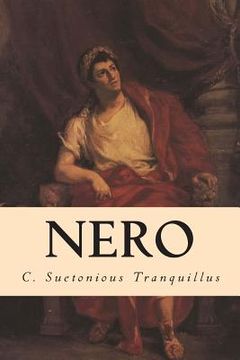Reseña del libro "Nero (en Inglés)"
Nero (15 December 37 - 9 June 68 AD) was the last Roman emperor of the Julio-Claudian dynasty. He was adopted by his great-uncle Claudius and became Claudius' heir and successor. Like Claudius, Nero became emperor with the consent of the Praetorian Guard. Nero's mother, Agrippina the Younger, was likely implicated in Claudius' death and Nero's nomination as emperor. She dominated Nero's early life and decisions until he cast her off. Five years into his reign, he had her murdered. During the early years of his reign, Nero was content to be guided by his mother, his tutor Lucius Annaeus Seneca and his Praetorian prefect, Sextus Afranius Burrus. As time passed, he started to play a more active and independent role in government and foreign policy. During his reign, the redoubtable general Corbulo conducted a successful war and negotiated peace with the Parthian Empire. His general Suetonius Paulinus crushed a major revolt in Britain, led by the Iceni Queen Boudica. The Bosporan Kingdom was briefly annexed to the empire, and the First Jewish-Roman War began. Nero focused much of his attention on diplomacy, trade and the cultural life of the empire, ordering theatres built and promoting athletic games. He made public appearances as an actor, poet, musician and charioteer. In the eyes of traditionalists, this undermined the dignity and authority of his person, status, and office. His extravagant, empire-wide program of public and private works was funded by a rise in taxes that was much resented by the middle and upper classes. Various plots against his life were revealed; the ringleaders, most of them Nero's own courtiers, were executed. In 68 AD Vindex, governor of the Gaulish territory Gallia Lugdunensis, rebelled. He was supported by Galba, the governor of Hispania Tarraconensis. Vindex's revolt failed in its immediate aim, but Nero fled Rome when Rome's discontented civil and military authorities chose Galba as emperor. He committed suicide on June 9, 68 AD, when he learned that he had been tried in absentia and condemned to death as a public enemy, making him the first Roman Emperor to commit suicide.[2] His death ended the Julio-Claudian dynasty, sparking a brief period of civil wars known as the Year of the Four Emperors. Nero's rule is usually associated with tyranny and extravagance. Most Roman sources, such as Suetonius and Cassius Dio, offer overwhelmingly negative assessments of his personality and reign; Tacitus claims that the Roman people thought him compulsive and corrupt. Many Romans believed that the Great Fire of Rome was instigated by Nero to clear the way for his planned palatial complex, the Domus Aurea. He was said to have seized Christians as scapegoats for the fire and burned them alive, seemingly motivated not by public justice but by personal cruelty.[6] Some modern historians question the reliability of the ancient sources on Nero's tyrannical acts.[7] A few sources paint Nero in a more favorable light. There is evidence of his popularity among the Roman commoners, especially in the eastern provinces of the Empire, where a popular legend arose that Nero had not died and would return. At least three leaders of short-lived, failed rebellions presented themselves as "Nero reborn", to enlist popular support.

